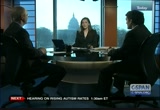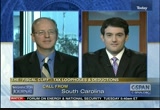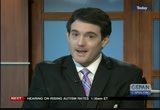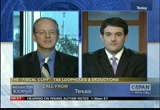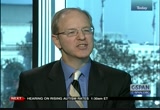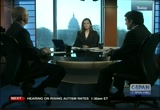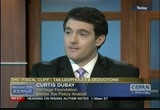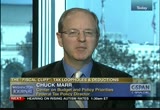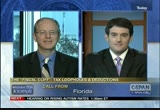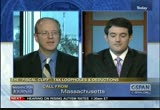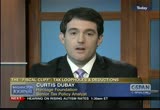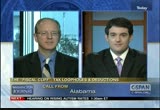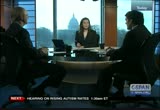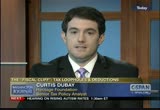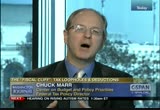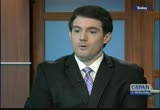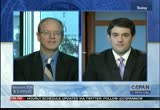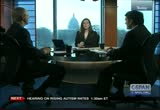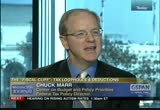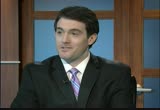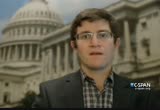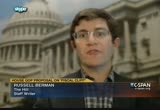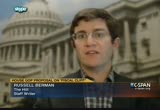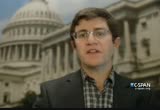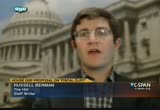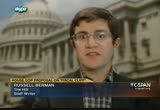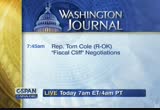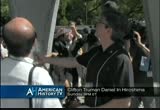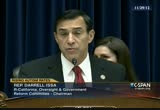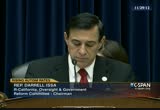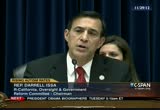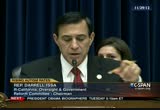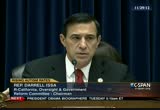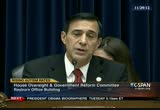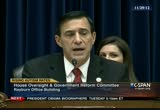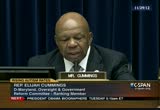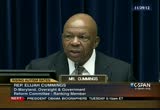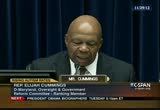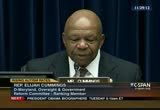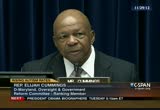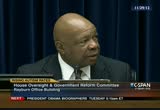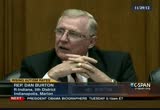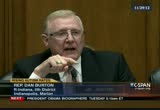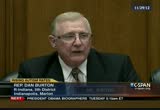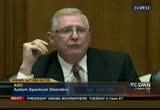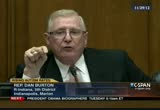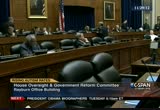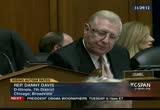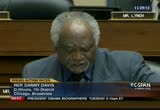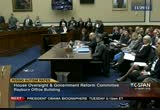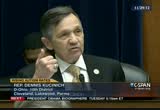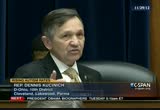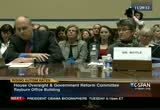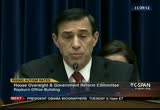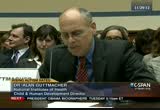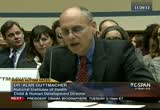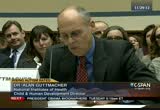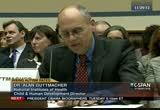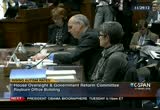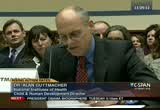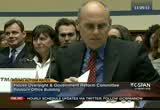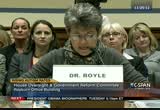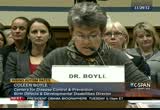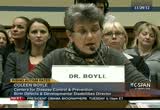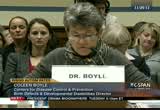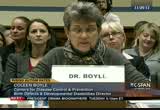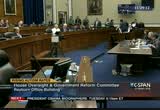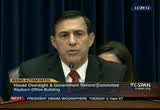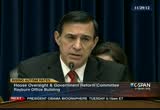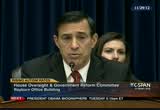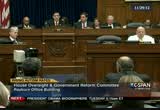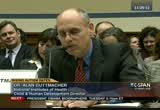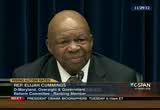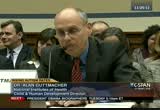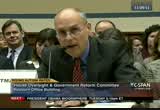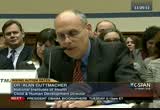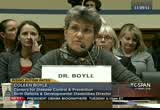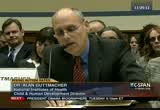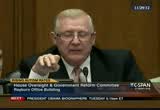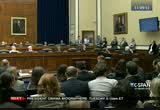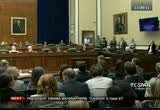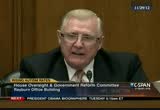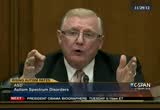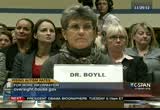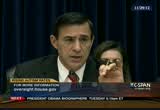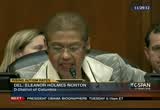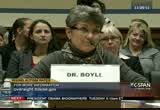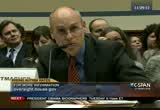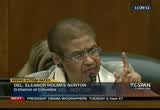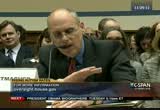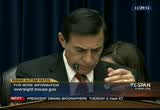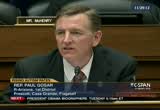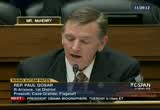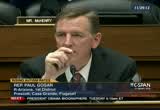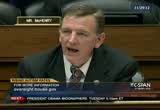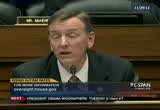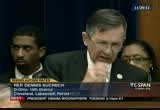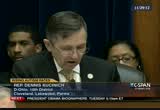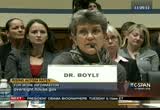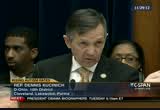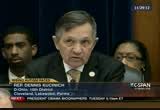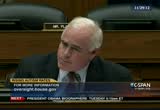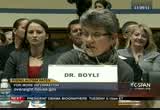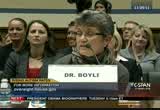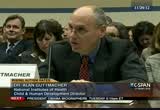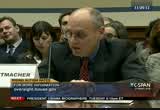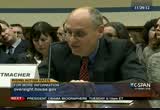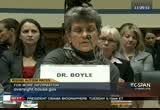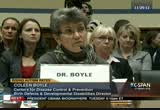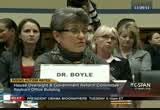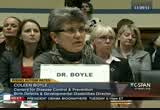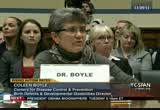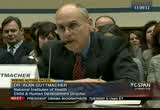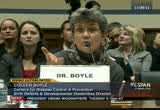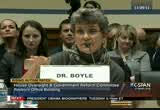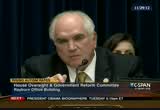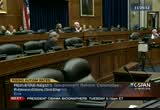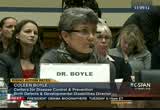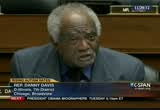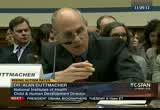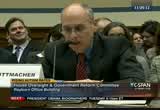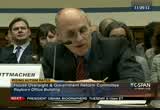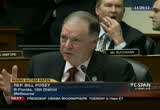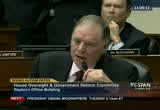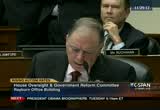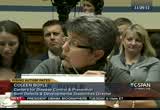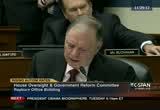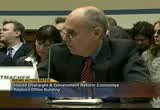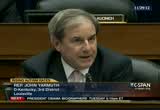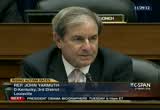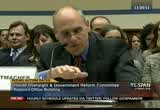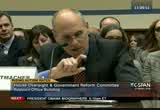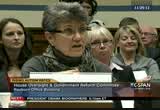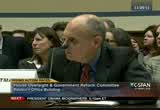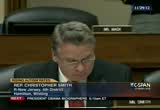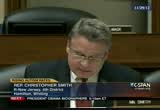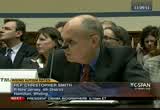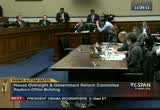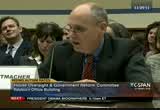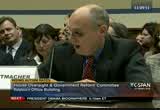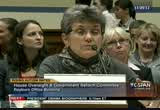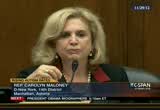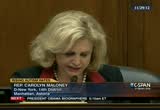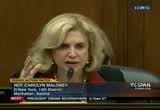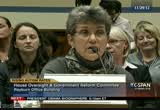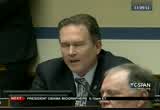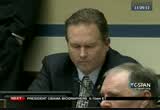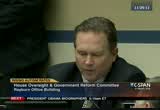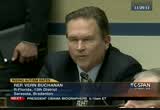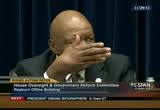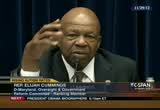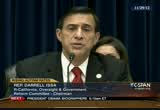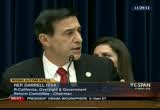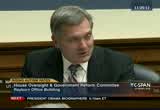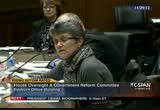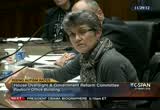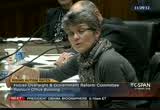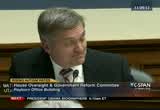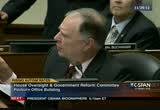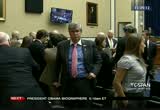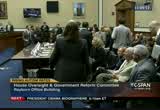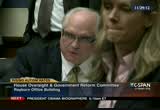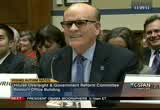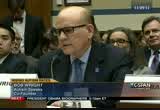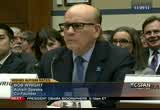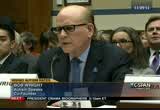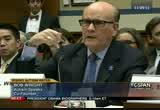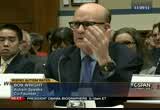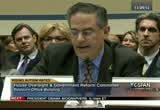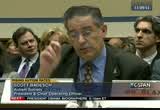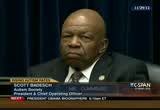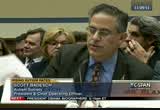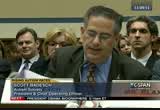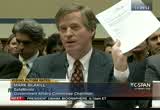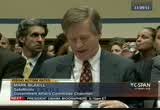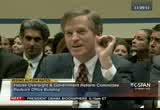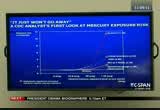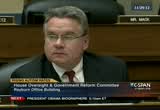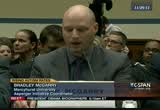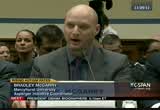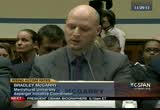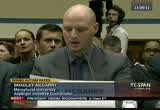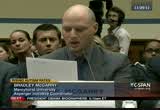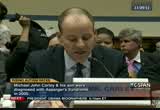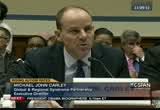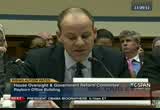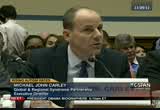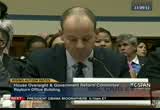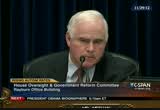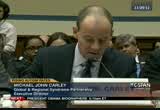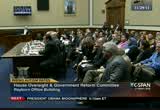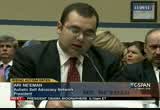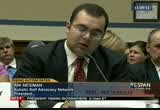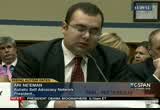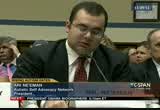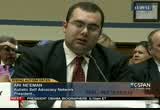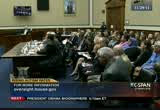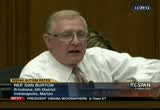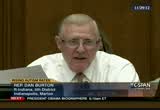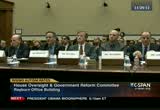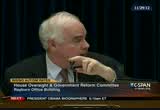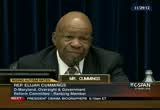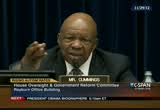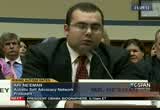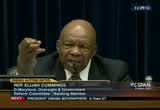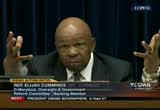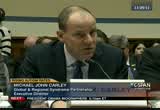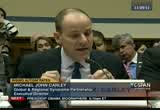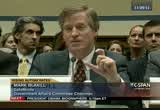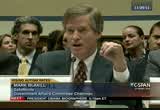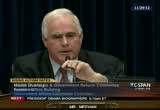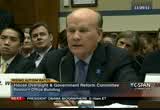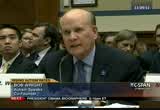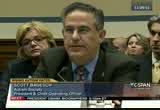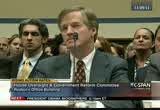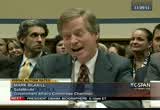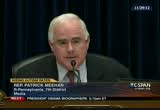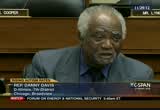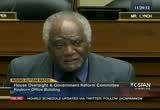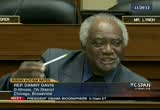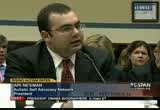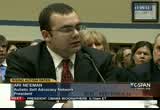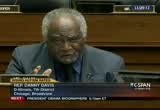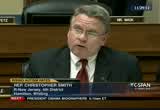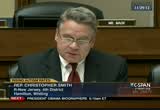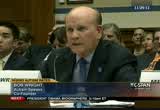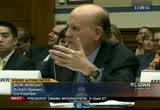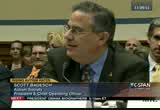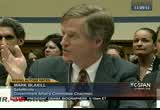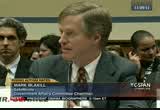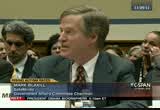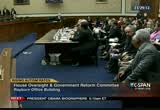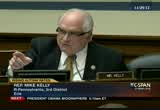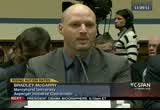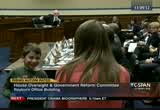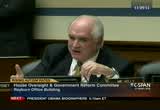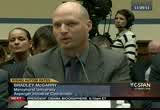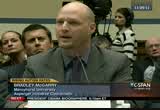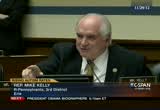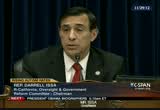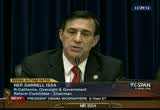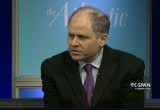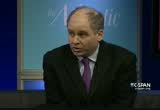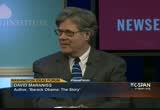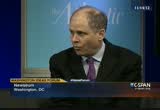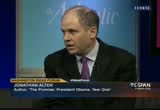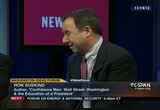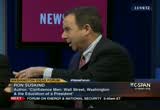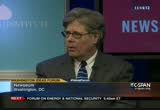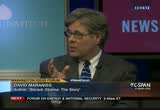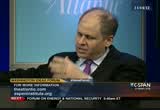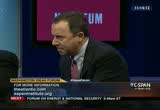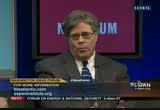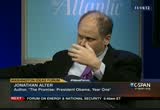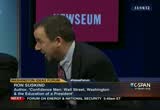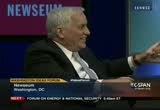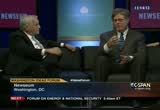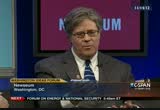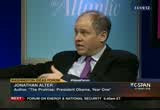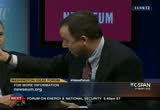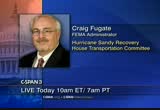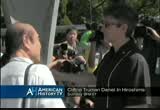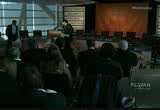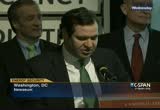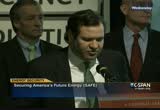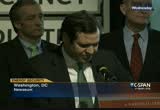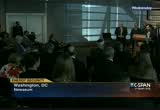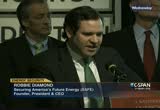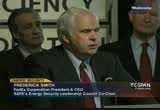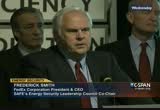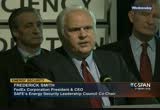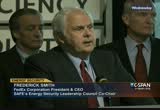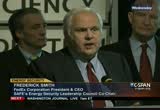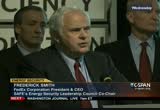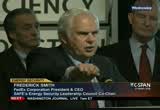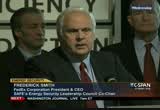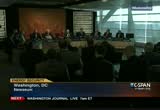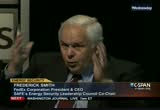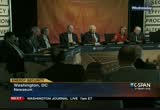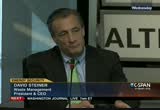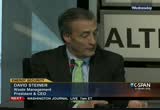tv Politics Public Policy Today CSPAN December 4, 2012 1:00am-6:00am EST
1:00 am
host: maverick writes in and said, i see a problem with giving tax credits for hiring unless employees make a living wage. thomas is up next from south carolina on our democrats line. caller: we are down here in foggy south carolina. thank you for c-span. host: thank you. caller: something that has come to my view on a c-span program the other night, two republicans and one democrat were expressing a need for a trust fund to finance infrastructure, which we need very badly, which would put people back to work from some form of tax on the infrastructure that we build.
1:01 am
it is the duty of our government to do things for people that they cannot do themselves. the rich can do for themselves. the poor people cannot. i'll hang up and listen. host: let's go to curtis dubay. guest: we keep hearing about infrastructure investment. but the way we do that is federal gaps. the 65 cents of every dollar raised for the federal gas tax actually goes to roads and bridges and highways. the rest of it goes to things that are not supposed to be funded by the attacks. sustainability projects, bike paths, roadside museums. i would much rather see us spending all of the money on
1:02 am
infrastructure and then come back in five or 10 years and say, well, maybe then. we are spending the money on infrastructure. it is a weak argument. host: let's go to laura. caller: i have two comments to make. the first is, the bush tax cut entitlements were supposed to be temporary. i remember when they were argued, and as far as i'm concerned, republicans live at that time. they never intended it to be temporary. they intended it to starve the government, which is a constitutional government. that makes me very angry. the other point i have to make is that i'm one of the long- term unemployed. right now, all of these discussions are noise. the root cause problem is a
1:03 am
lack of jobs and offshore in that has gone unchecked since 2000. if i do not have a job, i cannot contribute to my country. if i do not have a job, i cannot pursue life, liberty, and have it is. i cannot raise my child or pay for my house her i cannot do anything because there is no revenue coming in. all i hear are the republicans wining about the upper 2% not having their golf money. host: laura calling in from austin, texas. earlier we talked but the bush tax cuts and whether they were indeed intended to be temporary or not. the loopholes, are they intended to be temporary? are they here to stay? guest: they were intended to be permanent. you cannot underestimate how hard it would be to cut those. this is why republicans are
1:04 am
reluctant to propose this was a big changes. you need to get that money from the high end of the bush tax cuts and then see what reform you can propose. host: let's hear from charles in georgia. democrats line. caller: i want to know why it is so difficult for the 2% to pay their fair share. everyone is saying they have generated jobs. i have not seen a job generated yet. host: you take itemize deductions? caller: i am a military retiree. since i retired, the jobs have just not been here. this is the president came back into office complex it is coming back slowly around.
1:05 am
they keep talking about jobs, but i have not seen any. host: the second caller in a row complaining about the idea that the wealthiest americans will not let go of their bush era tax rate. guest: i do not like to talk about fair share because there is very subjective. but let's look up the numbers. the president said people over the $1 million tax rates should pay a higher percentage, the so-called about the role. according to the cbo, the top 1% is paying an effective tax rate that is three times higher than the middle class. viewers can make their own decision as to whether that is fair. break down the federal income taxes. again, that is 40%. by comparison, if you had a flat tax, if they owned 20% of income, they would pay 20%. and back to job creation, we will get less job creation. we are talking are raising taxes on small businesses and
1:06 am
investors. guest: governor romney tried to make the case that occurred as is making. it has failed miserably. it has failed in history. if it fails from campaign economics. the bush tax cuts disproportionately benefit high- income people. if we get rid of those we will save a lot of money and there is minimal risk to the short term income. high income, whether you are with a wall street bond trader or a ceo of a corporation, they tend to be less vulnerable to the ups and downs of their income and middle class people. we need to support those people. that will lock in savings again. host: next caller. caller: why can't we do away with the federal reserve? if they don't have borrowing power, they do not have debt.
1:07 am
that we cannot borrow money from china. let's do away with it. everybody buckle down for a decade and let's get this thing came down. host: let's go to our next caller in massachusetts. the democrats line. caller: looking at the fiscal cliff, we go back to 2001 with the lowering of the tax rates, meant to create jobs. but in the past 10 or 11 years, we have not had any job creation whatsoever. we keep going back and hearing over and over again that it's going to cost jobs. we do not have jobs to begin with. businesses are out to make money. if consumers do not have money to spend, then you can lower their taxes to 0%. they still cannot spend because they do not have any income. guest: i think that is a great
1:08 am
point. it brings up one thing we have not mentioned yet. the payroll tax cut is about to expire. if that expires, every paycheck in the country is going to go down about $1,000 on january 1st. that would hurt consumption. it would hurt the customers of businesses. the president has proposed to extend that. i think that is reasonable. we will see a firm public and
1:09 am
keep up their opposition or they give in. we have a sleeper here that cannot be ignored. if we do not extend that, every paycheck in the country is going to go down. guest: i agree. we should extend that for another year. it would be a big hit to the middle class paychecks. we are in no position to be hurting the middle class at this point. until now, there has been
1:10 am
bipartisan agreement that would probably be allowed to expire. the president has changed his calculation on that in the past week. i think that would be smart. host: in looking at the mortgage and real-estate deductions, you can see by category who benefits and how it breaks down. you can see how much money they get for their tax return. in dark blue we see the mortgage interest deduction and a light blue, the real estate tax deduction. we are talking about loopholes and deductions as part of the so-called fiscal cliff. ron in indiana. caller: the first young fellow. the question that i wanted to ask. everybody is talking about raising taxes on the job
1:11 am
creators and they will not create jobs. these bush tax cuts have been in place. how long will it take to see the job? host: what do you think of the deductions? you think they have been a part of the tax code lot of that americans cannot do without them? caller: some of them need to be part of the negotiations. middle class people, we cannot. forget them. but the upper class, they get the big tax cut. the middle class does not hardly see these deductions. and especially those that give you these deductions, they give
1:12 am
you loopholes. host: let's go to curtis dubay to get a response to that. our caller was talking about if you have the means to hire someone that has the ability to look through the deductions you can get a much better break. is it fair? guest: if you do not have someone to show you how to do it, it can be hard to take them. but for the most part, most people will take the standard deduction. they do not need to hire someone to take itemize deductions that they will not be able to take any way. that is the point of the bush era tax policies not creating jobs.
1:13 am
if you look at where we were back then, we were in recession when these tax cuts went into effect. they were always meant to be permanent. there were supposed to help the economy help growth going forward. we had a recession as part of the last decade. we have fairly strong growth from 2003 through 2007. we are still feeling the fallout from that today. raising tax rates on job creators and small businesses will cut back on job creation. we will see those who would have otherwise gone back to work failing to get a job going forward. guest: most small businesses are small. 97% of small businesses, their portions are tied to the middle class.
1:14 am
it is important for their tax cuts to be extended. it is much less important for the high-income people to have theirs extended. if you're talking about the ceo who wants to play golf and also by a vote, maybe there could be more incentive to play golf, and work a little less. what economists find is the the work ethic for the high-income people is not very sensitive at all to the change in tax rates. that is why the cbo says that if the high end tax cuts go away, growth rates will only be affected by one-tenth of 1%, which is a tiny fraction of the affect on the middle class. host: someone writes in, if the tax rate did not hurt small businesses, then why should it
1:15 am
now? and here is another. guest: basically, 2% or 3% of small businesses would pay the higher number. most small businesses are people selling items out of their basement on e-bay. those that create jobs, they are in the 2% of small businesses. they would pay higher rates that president obama is proposing. it would be a direct hit on job creation. and over and talk about raising tax rates at the top, it is not because we are worried about whether the rich can buy an extra vote. we are worried about their ability to invest in the economy. host: let's hear from mary in topeka, kansas. caller: i had a couple of comments. and then maybe let them answer. one, a republican, but i guess i'm not a very loyal one because at this point, between the republicans and the democrats, i am totally fed up with what comes across on the national news. both sides seem to be spinning
1:16 am
the truth into lies for their own political gain. we need a solution that is not 25 years away. but i do not know how it is going to be done when the president -- and as far as i can see, he has not even sat down for a talk that lasts more than an hour or so. he has other people doing is talking and expects the republicans to try to make a deal. you cannot make a deal with a third party and then have a first party reject everything on the plan and never sit down and discuss it.
1:17 am
you cannot make a deal when you are not doing face-to-face talks. host: what do you think should be up for negotiation? and things like deductions in taxes? caller: i'm self-employed. i cannot make enough money working a regular job. and my employers will not pay me a livable wage. and not only that, they do not want to give me, 40 hours a week. they want to give me 38 and pay $9 an hour. host: if you can broaden that out, chuck, and talk about negotiations in general. how much should the american public know about how much the mortgage deduction is on the chopping block? guest: i think they should know everything. both sides should be specific and public, which is what the president has done.
1:18 am
theas said, let's make middle class tax cut permanent. he has said we need to lock in the savings. he has said that the higher income deductions need to be cut. he has said to trim medicare, but in a modest way. republicans are trying to protect the very popular high- end bush tax cuts. how do they make that up? they cut mortgage deductions that we've been talking about, and medicare. and they want to cut both of those, but it seems they are afraid to say that. if the republicans do not want to let the high end push tax cuts sunset, how will they make up that money? how much from medicare? how much from the mortgage deduction, a charitable deduction? people deserve to know that. host: here is a tweet. we need a flat tax and stop all the flap in.
1:19 am
guest: that would be great. we have a flat tax at the heritage foundation. you can see it at the website. there has been an effort in the last couple of weeks to broaden the negotiation to something bigger than a grand bargain. i think that is largely misplaced. let's focus on the issues that are most pertinent right now, which is the expiring tax cuts. let's focus to what matters by the end of the year. host: thank you both for joining us. >> a bunch of reporters were called into a closed-door briefing today.
1:20 am
>> it would be about $2.20 trillion. that is on top of what has already been enacted. $800 billion in new tax revenue the republicans --republicans say it would come from tax reform, but not to increasing tax rates. that has been a sticking point thus far in negotiations. >> you are talking about the bush tax rates? >> all of the bush era tax rates would be extended into next year and that would start the process for tax reform. it would be in the tax reform process that there would generate -- and they would generate $800 million -- $800 billion in revenue. and they say the $800 billion could be raised without raising tax rates, and this is something that is in dispute with the
1:21 am
white house. the white house said there would be no deal unless republicans agreed to increase tax rates on the wall the next year. >> what do the republicans say about the debt limit, sequestration, automatic spending cuts, and changes to entitlement programs? >> that was not addressed. the white house offered to make permanent the changes. republicans are not proposing to raise the debt limit at all. but if you ask their aides, they told us that the speaker would be open to increasing the debt limit, but he is sticking by his role that any increase must be accompanied by cuts and/or reforms. it could be on the table. entitlements, they are not laying out this was a big changes to medicare and medicaid. what they are saying is they want the $600 billion in health
1:22 am
savings. they mentioned things that had been mentioned for about a year-and-a-half. including waving the eligibility age for medicare from 65 to 67. and the wealthy will either pay more premiums, or receive less in that if it's a ban to other american -- in benefits that other americans. the only change to social security that they're proposing is something that has come up repeatedly in these negotiations, which is a change to the way the benefits year over year are calculated. changes to the way inflation is calculated and the way that would reflect the social security, medicare, and a range of other policies. that is something that liberals have not opposed. it has been broached often in these negotiations. >> what is the gop presenting for spending cuts? gregg's that is not something they are specifically offering. the sequestered about 10 years
1:23 am
and $1.20 trillion. they are offering $2 trillion in the next 10 years. everybody is talking about the way to replace the sequester is to find alternative cuts and other reforms that would equal or exceed that $1.20 trillion. republicans are pretty much presuming that this offer, if accepted, the sequester would also be eliminated at the same time. >> house republicans given any ground based on this proposal? >> it is essentially overturned. it is very similar to what erskine bowles, the former clinton chief of staff, who was the co-leader of the simpson- bowles commission, separate from that commission, mr. bowles testified before the super committee last year and testified at that time. republicans say that their current model is modeled after that offer. the simpson-bowles model has
1:24 am
1:25 am
negotiations in 2011. the white house has consistently signaled a loss of of weeks that they will not accept any deal that keeps tax rates for the wealthy. >> russell burma is a staff writer for the hill. thank you. >> thank you. >> and you can go to our website c-span.org to read the letter that the president wrote to house rubble can survey.
1:26 am
1:27 am
>> this weekend on c-span 3, the city prepares to mark the dropping of the atomic bomb in 1945. >> everybody has their own view of what happened. i do not want to argue. i think we are past that. my whole purpose for being here is to honor the dead and listen to to to accommodate what i can to say this as the happen again. >> we will be joined in washington to discuss meetings.
1:28 am
>> the members of congress were told -- the committee also heard from advocacy groups in this hearing. >> the committee on oversight and government reform will come to order. this hearing on 1 in 88 children looks into the federal response of rising rates will come to order. americans have the right to know the money washingotn takes from them is well-spent. americans deserve an effective and efficient government that works for them. our duty is to protect these
1:29 am
rights. our solemn obligation is to hold government accountable to taxpayers because taxpayers have a right to know what they get from their government. we worked tirelessly with citizen watchdogs to bring genuine reform to federal bureaucracy. this is our mission and i might say today, in many cases, we're dealing with people because of this affliction who may never pay taxes but in fact their families and others paid for an entire life. congress spends a lot of time discussing and debating issues
1:30 am
and determining by our philosophical beliefs with the role of government should be. as we have seen in these debates surrounding tarp, stimulus, health care reform, these kinds of issues oftentimes come down to where you fall on an ideological spectrum. today is no such thing. we're having a hearing focused on something that spans the ideological left to the ideological right. we're drawing attention to something that has no political affiliation, no partisan allegiance, and sometimes and we believe today not nearly
1:31 am
enough focus on something that does not shorten life, but dramatically or even slightly but usually more than slightly reduces the quality of life, both for the individual and for their families. i am a father. as far as i know, i am one of the fortunate ones. i am not the 188. but right now, if the numbers are accurate and if they continue to grow from one in 88 as affected, we in fact have an epidemic. it could be that some of the one in 150 at the start of the previous century was too low and in fact people were simply not diagnosed. a few people believe that come in fact, there are not factors in our society and our behavior in the air we breathe, the water we consume or others that are affecting how many people will be afflicted. we will hear from a distinguished panel first of people who do this for a living, trying to get to the
1:32 am
causes, prevention, i will secure today, but at least the treatment, -- i will not say fewer today, but at least the treatment and something to mitigate their suffering. i know they are frustrated. congress, although we put nearly a quarter of a billion dollars a year directly into research, has not the dollars perhaps that can bring specific outcomes sooner. on our panel, in number of individuals will say that one of the problems is that we're looking on one side of the equation and not nearly enough on what to do for the victims. the fact is that they are all right. there is not enough money being placed on the various possible causes of autism. there's not enough steady. our government does not collect statistics as well as perhaps
1:33 am
someday soon we will so that we can find out what the true number is, cross check every aspect of how that number came to be -- that number of human beings came to be afflicted. we have a lot to do. i will not claim that i have come here timely. this is the last few days of my first two years as chairman. and this is our first hearing. but i will promise you here today that we will stay involved in this issue. we will stay involved through task and through, if appropriate, additional hearings. i would also would say to our first distinguished panel said one of the prairies i have put forth today is that we work with you and help you with this process, that we be a conduit to the rest of congress on this important issue.
1:34 am
in a few moments, i will be recognizing by unanimous consent in number of members who would not ordinarily be here at a hearing because they are involved in this issue but served on other committees. additionally, i want to apologize to all of those people who rightfully so would be well to be heard here today. i could have had a second panel of at least 20 witnesses, of organizations and affected individuals. we have the difficult job of selecting just six. and as the ranking member will undoubtedly agree, 6 is already a fairly large single panel. that is one of the reasons that i pledge you today that any organization or individual that, in the next seven days, provides to us as recorded by our rules in electronic format or, if you give it to us in paper we will try to scan it, we will include your statement and your information in the record. we will hold the record open so that the man you could not be heard live in testimony will in fact be at least in the record.
1:35 am
i want to particularly recognize ryan hooker with focus autism, the american academy of children -- it is actually a long, long title. i am sorry. who in fact has been one of the people who has championed for today's hearing. and a number of others. i would also like to thank and we will be recognizing two members on each side -- the former chairman of the full committee who began the process of focusing on some aspects of this terrible disease. we do not know enough. our goal is to know more. today is of but a down payment on that. i want to thank the ranking member in putting together the hearing today and we will hear
1:36 am
his opening statement pierre >> thank you very much, mr. chairman. i do thank you for holding today's hearing. before i get started. i want to pay special note, as you have already done, to our friend who is leading, mr. burden. over my 17 years on this committee, this has been an issue that he has constantly put forth and constantly made sure that we tried to address it the best we could. so i would like to thank you for your vigilance. although you may be leaving the congress, as the chairman has said, we will continue to fight and i know you will, too. mr. chairman, we have learned much about autism spectrum disorders over the past decade. taxpayers-sponsored research have evaluated therapies with some symptoms.
1:37 am
decisions now have a better understanding of the developmental kinds of symptoms that a line with earlier detection. investigators have come up with new methods and assisting children with autism. congress has held -- congress is also happy to help individuals with autism and families in significant ways. we passed the affordable care at, which includes the significant protections, where insurers may no longer impose a life term caps on coverage. new plans must include screening for autos and without additional parts to the plants. and young people diagnosed with autism spectrum disorders may remain on their parents' health insurance plan until they are 26 years old. these are real and significant protection that will improve the lives of millions of
1:38 am
american families. even with this progress, there is still more to learn and there is still more to do. while autism of fax all ratio -- autism affects all the ethnic and economic groups, delayed diagnoses cause minority children to be for the deaf -- for the behind in development in language and motor skills. we must be vigilant in early detection for all our children. as an early diagnosis can make the critical difference in the lifelong development of a child. we must also continue to invest federal research dollars in new
1:39 am
and evolving therapies to improve the lives of those with autism spectrum disorders. in my district, we have the kennedy krieger institute, an internationally recognized institution dedicated to improving the lives of individuals with developmental disorders. these institutions improve the quality of life, education and continued development of those affected by what is a spectrum disorders and we must continue -- affected by autism spectrum disorders and we must continue to support them. there are many experts, individuals and groups who can help us in this effort. i want to take this moment to thank all of you for being here. as the chairman said, there are so many people interested in this issue, so many who wanted to speak. but i want to say to you what i said bob wright of autism speech earlier today. i think you for caring about somebody other than your children and ourselves. because what you're doing here
1:40 am
today is raising this issue so that other children, other than those that may be in your own family, maybe your friends, will benefit in the future. you're touching the future and you're making it possible for those who are going through the optimism -- the hottest inspector disorders to have a better future. so -- the autism spectrin disorders to have a better future. so i urge you to stay the course. one thing i have learned in 17 years is that, in order for these causes to move forward, you have to keep banging the drum. and you must bang it louder and louder in presenting your case so that, after it is all over, as my mother would say, motion, commotion, emotion and no results. i want you to be successful in what you're doing. life is short. so we must try to use our energy so that we can get the best possible results. i am so glad the chairman said what he said about sticking with this, addressing it, and we encourage all of you to work with us as we move forward. mr. chairman, i think you. >> i thank the gentleman. now i recognize the former chairman of the full committee.
1:41 am
>> let me start off by saying, contrary to what has been stated in the media over the years, i am not against vaccinations. i believe that vaccinations have a very important place in our society. they give us one of the best health regimens in the history of mankind. people live longer and have less diseased because we have vaccinations. what we have always opposed is putting toxic chemicals or medals in the vaccinations. the marisol contains mercury. when i was a boy, we used to have mercury in thermometers. and they said, if you break that thermometer and the mercury gets on your hands, as years went by, that was toxic.
1:42 am
in indianapolis, we had a school where, in the chemical laboratory, in the health science room, they broke a vial that had some of it in it. they evacuated that school. the fire department came in with all kinds of equipment to make sure they were not exposed to it. women who are pregnant, they say don't eat fish that has mercury in it and they cautioned them, the that there is surgeonfish you can eat. there are all kinds of reasons not to be exposed to mercury. yet we continue to put it in vaccinations as a preservative. in 1929, they came up with for marisol. they tested it on 29 people who had meningitis. they all died of meningitis, but the the mercury in the vaccination was not a contributing factor. so since 1929, it has never been completely tested and they continue to use it in vaccinations. it was not so bad when wenchow got a vaccination or two or three.
1:43 am
but now they -- when one child got a vaccination or two or three. but now they get 29. the brain tissues to not -- it stays in there and it causes severe problems. during my chairmanship, for six years, we had four years of hearings. we had people from all of the world, scientists from all over the world, doctors from every part of the united states who testified. and people from cdc and fda who testified that there is no evidence that it caused any neurological problems in people who are vaccinated. and then we kept on and we kept on and then we finally had people from fda and cdc who testified who said there is no conclusive evidence that the mercury in the vaccinations causes neurological disorders. no conclusive evidence. that word, conclusive, ought to
1:44 am
stick in everybody's minds. what it means is that there is a possibility. and my question has always been and i am convinced that the mercury in vaccinations is a contributing factor in neurological diseases such as autism and alzheimer's. but that word, conclusive, there is no conclusive evidence, that creates a doubt. and my position has never been that, if there is any doubt that the mercury in vaccinations can cause a neurological problem, then get it out. you should not put mercury in any form in the human body, especially in children in vaccinations or in adults. when we get a vaccination for the flu, every year, we get a flu vaccination, we have thermerisol.
1:45 am
they are injecting a certain amount of mercury in your body. and over time, i believe that it has an adverse affect on the neurological system. but let me just say that the thing we need to do is always err on the side of safety. if the pharmaceutical industry were to go to single-shot weyl's, that would eliminate the possibility -- single-shot vials, that would eliminate the possibility because it would not have any mercury in it. we passed the vaccine injury compensation act to compensate those people injured by vaccinations. it was something that people could work with to get that money. the pharmaceutical companies are putting money into that fund. but it is so hard for someone who has a damaged child or
1:46 am
damaged an adult to get money out of that fund. it is unbelievable. we need to reevaluate the fund to make sure that people who were damaged by mercury in vaccinations have access to that they can at least have some compensation to help with the rest of their lives. these people will live 60-70 years and will be a burden not only on their families but on society itself. >> i now ask unanimous consent, mr. posey of florida, mr. burrows of georgia and mr. matheson of utah to be allowed to sit in and ask questions at the conclusion of the other seeded members. without objection, so ordered. it is now my pleasure to recognize the distinguished gentleman mr. davis. >> i thank you for calling this hearing. as one who has spent much of my adult life working as a professional in the areas of
1:47 am
health planning, health research and delivery, i firmly believe that the federal government has an important role to help understand what is in spectrum disorders and -- understand autism spectrum disorders and to help those with its inner life span. i also want to commend the former chairman of this committee, my good friend dan burton, for using his position as chairman and beyond to focus on this particular issue and calls the committee and others to continuously take a hard look at it. i commend you for your efforts and certainly wish you well as you revert back to private life. i am very proud to represent a premier institution involved in the research and service provision of people with autism, specifically therapeutic schools and centers for autism
1:48 am
research operated by the easter seals in my congressional district as a part of the illinois medical district, which is the largest medical district in the country. this one-of-a-kind facility is unique in the nation because it combines on a single campus educational, research, training, rudy intervention, is it early intervention, move to work transitions, and independent living capabilities. the continuum of services for persons with autism is impressive and it would help to advance the research-driven context for teaching, learning, and clinical and medical intervention related to autism. as an ardent advocate for persons with all types of disabilities, physical, mental, or developmental, i supported
1:49 am
the provisions for protection in the affordable care act that protect families and individuals affected by autism spectrum disorder. i want to thank all of the witnesses for coming to join with us. mr. chairman, i think you for calling this hearing and i look forward to our discussion here this afternoon. i yield back pierre >> if the gentleman would yield his remaining -- i yield back. >> if the gentleman would yield his remaining time to the gentleman from ohio.
1:50 am
>> thank you very much, mr. chairman. i remember well, as i am sure mr. burton does and as other members of this committee do, a time when a provision was snuck into a bill on a homeland security that essentially shielded from lawsuits the manufacturers of thermerisol. no one for the members who have been here in the last 10 years you were the provision came from. it came out of nowhere and it was buried in a conference report. i mention this because it is not as though we just discovered this matter. while i salute the chair for holding this discussion, my theory is that, while there are studies out there that implicate environmental factors, think about this for a minute. we know, as mr. burton laid out, the components of thermerisol, the stabilizer is mercury. we know that the mercury is more than a contaminant. is -- it can come in other than
1:51 am
a liquid form. it can also be in held. women and to be talking about pharmaceutical manufacturers. -- we may not be talking about just pharmaceutical manufacturers. we could be talking about coal companies as well. we have 11 million others contributing millions of dollars to affect the outcome of elections. while i salute this chair for taking this time, because, at the bottom of this, you have special interest groups who would resist any deeper research on it because it will affect their bottom line. meanwhile, you have children all of the country turning up with autism. this is a new beginning. i salute the chair for making it.
1:52 am
but this goes way beyond thermerisol and start thinking about cole. >> i now -- about coal. >> i will announce that, if any individuals would like to be in a little more comfortable situation, we do have an overflow room. if you will let our staff know, there will make sure that, if they gave up their seat here, they can go to the overflow room and be a little bit more comfortable for some of our guests. i now turn to our first panel. the distinguished doctor allan gutmacher is the director of the shriver institutes of health. i knew the name sake of your organization. and director colleen boil is of
1:53 am
the center of birth defects and developmental disabilities at the cdc. pursuant to the requirements of this committee, will you please rise and take the oath? raise your right hand. do you both solemnly swear or affirm that the testimony you are about to give will be the truth, the whole truth and nothing but the truth?
1:54 am
thank you. please be seated. let the record indicate that both witnesses answered in the affirmative. you are important witnesses and we will not stop you if you go slightly over. but we do have a large panel and we ask that you bear in mind that all of your opening statement in any extraneous mature a maybe -- may be entered into the record. with that, you are recognized pierre >> i am also a pediatrician a -- you are recognized. >> i am also a pediatrician. we authorized the authorization act of 2011.
1:55 am
we think the congress for its continuing support of research and other activities regarding what is a spectrum disorders. that support made possible -- regarding autism spectrum disorders. possibleboard made support for families. the combination in degree of impairment very, from an array of conditions from what many will see as normal to significantly disabling. two decades ago, it was thought as rare. today, the cdc estimates show that it is a national health priority. the iadc plays a pivotal role in getting the government and the public and nonprofit organizations to address this. it includes individuals on the autism spectrum, parents and children of adults victims. we will come public comments at all committee meetings and invite public comments and hold town halls. it informs iacc recommendations. it is a committed group. while the law requires two meetings a year, they may need
1:56 am
as many as 17 times a year. the law charged it with a strategic plan annually. we are drafting as always with autism committee influence an update to reflect the latest aspects in what is a research -- in autism research. over the past decade, research funding has grown substantially. investing $169 million in just the year 2011, three times more than 10 years ago. in 2009 and 2010, 120 two million dollars in an additional american recovery and investment act funds were also presented. as congress has emphasized, early diagnosis and and prevention is critical. these earliest changes ever recorded was six months and a number recent findings suggest that the factors causing it may operate very early in
1:57 am
development. last year, researchers demonstrated that doctors often have a short questionnaire to screen inexpensive way in a child visit. another promising diagnostic tool is i gazed patterns specific to what is of -- is eye gaze patterns specific to autism. recent trials have validated early interventions and quality of life. recent behavioral interventions showed improved i q, language and social development in young children. and progress is also being manned intervention for adults. a recent study shows that, for the many adults who have impaired ability to recognize faces, a computerized training program improves facial recognition skills. many of the vances is a program that supports nine centers and networks across the country with two additional awards expected in 2013. the research covers a variety of lines, including nonverbal ase, an environmental risk factors in determining why it is five times more common among
1:58 am
boys. we do not know the causes of asd, but we highlight the need to focus on both environment and genetics. we have established large networks to collect data and conduct powerful analyses. those networks explore possible causative factors in the environment before, during and after pregnancy. one of these networks published a study that suggests prenatal and early life exposure to car emissions is a factor. in 2012, congress appropriated over $47 million for autism and other developmental disorders. this supports 43 training programs through 41 states and projects for underserved populations.
1:59 am
2:00 am
there is a call center, web based -- the nih supported the association in the early prevention of autism. in conclusion, since the establishment, wide expertise has come to bear on autism with research rapidly translating into individuals and the community. coordinated efforts to identify best practices to support the lifelong education, health and employment needs of the people in the spectrum. thank you for this opportunity to provide testimony on such an important topic. >> thank you, doctor.
2:01 am
>> good afternoon >> thank you for the opportunity to be here today. i am an epidemiologist. cdc works to keep america safe from health risks of all kinds. our 2012 what is and budget is about $21 million. today, i -- our 2012 autism budget is about $21 million. today, i will explain how that is used. asd is a group of developmental disorders. while there is no known cure, research is yielding innovative screening close to detected in that early childhood and new behavioral therapies that can improve outcomes. cdc data indicate that more
2:02 am
children are being identified then previous years. the toll is significant and has profound implications for the affected children and their families. cdc works steadfastly to alleviate this burden by tracking asd, promoting the early identification and addressing the unanswered questions we research. cdc supports asd surveillance and tracking in 12 states -- utah, colorado, arizona, missouri, wisconsin, north carolina, new jersey, maryland, south carolina, arkansas, alabama and georgia. the goal is to provide comparable population-based data. in much of this year, cdc released updated efforts based on the 2008 did it indicating that one in 88 children had been identified with an asd.
2:03 am
this is > the one in 10 released in the 2006 -- that is greater than the 110 released in 2006. we know it is at least in part to improved diagnosis and increased recognition. the adam network provides more than just prevalence estimates. we know that asd remains most common in boys than in girls. we know that the largest increase of the kind is among hispanic and african-american children and children without intellectual disabilities. we know there is a privilege that varies widely from 1 in to 10 to 1 in -- from 1 in 210 and 1 in 147.
2:04 am
every day, our children need help and our data is helping to provide that. cdc works to increase early identification by offering free tools and assistance through our learning assigned act program. we provide tools to help professionals, health care providers and parent's with a focus on minority and physically disadvantaged populations. national goals in early screening, diagnosis and service and roman give communities and the federal government a benchmark to measure progress.
2:05 am
we must first understand the risk factors. the cdc studies explore early development and it is the largest study of asd in the country and it involves sites in georgia, north carolina, massachusetts, iowa, california and pennsylvania. cdc works to find factors that put children at risk, including genetics, environmental, maternal health and behavioral factors with special emphasis on the interaction between environment and genetic factors. we are an active member in the coordinating committee and we provide that epidemiologic perspective. our activities are key components of that plan. asd is an important and immediate public health concern. more children than ever are being identified and families and communities are struggling with the financial burden.
2:06 am
we know it is frustrating to have more questions than answers. and we share that frustration and are committed to improving our understanding of what is putting our children at risk. cdc will continue to document the burden of asd in states through our adam network, develop resources and help states improve early dedication throughout our learning science early first program. thank you for the opportunity to provide this testimony and i would be happy to answer questions. >> thank you both. i will recognize myself first. i will ask the experts to forgive me for being very basic in a couple of questions.
2:07 am
but i hope it sheds a balance on this hearing. as far as you know, is autism in history predate all vaccines? was their optimism before there were vaccines? -- was their autism before there were vaccines? >> i would refer to my colleague but i would say definitely. >> autism was not describe until 1943. he first noticed 11 individuals with similar patterns of behavior is and he coined the term autism. >> but were those likely or documented lay -- i want you to say with certainty or with likelihood. i think it is important for all
2:08 am
people who are dealing with this. >> i know that dr. connors view and others is that this possibly existed before. just no one had noticed the patterns. there are descriptions of individuals before the immunization era who would have what we would take today to be autism spectrum type disorder. there is heavy suspicion that it existed before vaccination. >> is it fair to say that today, the state of science is that atutims of various types have -- that autism of various types has several causes. >> absolutely. genetic, biological, and enviornmental. >> i am trying to be very basic and i apologize. but i think for all of us, as we go through this, it is important to build on something.
2:09 am
so it is fair to say that autism, like cancer or other diseases, is often a group of afflictions. meaning that, although the characteristics are similar, there are multiple causes and likely multiple treatment and multiple forms of prevention. >> i think it is not only fair to say, but as simple as that question may be, the most important question in some ways to ask that help explain some of the challenge in trying to figure out what isn't and the direction to do it. the better we'll understand the biological bases of these different forms of optimism, it will make it difficult for us to hunt -- of autism, it will make it difficult to emphasize any of them. >> is it fair to say that we can rule nothing out in absolute terms from being a contributor? we heard the gentleman from ohio talking about mercury coming in
2:10 am
air form. the former chairman talked about the possibility of vaccines having a direct relationship. is it fair to say that the multiple causes we suspect, the fact is that we can rule nothing out of including things we have not yet looked at? this is not only an unnecessary but also critically unfair to a large group of people in our society. to prevent the scenario, changes must begin now.
2:11 am
mercyhurst is dedicated to preparing ala graduates for productive careers. we have tried to develop -- the age of parenting. would either of you feel comfortable talking in terms of waiting to have children and science is cooperating. is that an area that needs further study? >> it does need further study. there is evidence that suggests paternal age does have a correlation with the rate of optimism. it is clear that is not a factor. many older fathers have children who cannot have any form of optimism -- autism. in any given situation, it is
2:12 am
not the factor but -- factor. >> thank you. i apologize i did not have -- ask certain questions. there are many interest groups i meant it into components that i did not even mention here today. >> thank you very much, mr. chairman. in talking to the folks behind you, and there seems to be a frustration. i wish you could see them behind you. they are shaking their heads. with regard to coordination of efforts, research.
2:13 am
and in my opening statement, i said i want us to move toward tried to make a difference. i know that is what the chairman feels too great we do not know how to book -- how we will be sitting on these panels and in congress in but we want to use our time effectively. what can we do to help the folks behind you get to the kind of thing they're looking for to have an impact? they are thoroughly frustrated. can you help us with that? >> we can also share your frustration. all of us are frustrated at the rate of progress in terms of understanding autism. perhaps because be are involved
2:14 am
in it we have a different perspective. in terms of what congress can do, some of you have already done. in terms of funding but also attend the terms of the role of the autsim coordinating committee. imagine the frustration -- you imagine the frustration of coordination. they have done a good job coordinating work among federal agencies but also coordinating the federal agencies and advocacy organizations to really try to come up with a community to point about one should parties be within research. and service delivery and invention. while there is always room for better coordination, the
2:15 am
coordination among agencies is much better than it was a number of years ago. saying we canalso do better? major federal efforts to confront a significant health crises have been mounted in the past. they had been in the focus of major efforts. how do you think the federal effort to confront office and spectrum disorder -- austim spectrum this order compared to those other efforts? >> they each present their own challenges and opportunities scientifically. one of the particular once the chairman and referred to a in terms of the the versus -- of the diverse conditions we are lumping as one.
2:16 am
it also presents ordination challenges as well. it is hard to compare one disease movement versus another. they need to all be crafted with the acknowledgement of the attacker quality of the disease or diseases. >> austim, like breast cancer, as a very complex issue. with federal dollars, we have made considerable investments in research and programs and tracking. we are just starting to see some of the benefits from that. there really is an explosion of the formation, and lot more to be done, particularly on the environmental perspective.
2:17 am
that is a discussion at the iacc level. >> the courtney committee is the tip of the sphere in the federal efforts to regress autism. in the committee's ability hampered by the absence of representation from private and nonprofit sector? with the coordinating committee be better positioned to treatment and services are important elements? >> the newly reauthorize committee is larger than its predecessor. that has been an advantage to the committee. it has more membership. like any committee, it struggles with wanting to clearly be inclusive but at the same time making the committee affective
2:18 am
in terms of size, etc.. i think the committee tries to make sure about the inclusion by inviting public comment at meetings, have a town halls, other kinds of things. even those not represented directly on the committee have a voice in the room. >> i would agree with that. >> i now ask unanimous consent that the gentleman from virginia be allowed to sit in this hearing without objection. so ordered. also unanimous consent that mr. burton has waived two minutes of his five minutes so he can show a video before he begins. it the video can be shown that the gentleman will have three minutes afterwards. >> thank you, mr. chairman. let me preface my remarks by saying i know there are many causes of artisan but the one you're talking about is the
2:19 am
mercury vaccinations and in the environment. i want everybody in the room to see what the research shows. [video clip] >> how mercury causes brain degeneration. it is a potent toxin substance, whether in help are consumed in the diet as a food contaminants. medical research libor doris have established that in amalgam tooth fillings are a major contributor to mercury. in 1997, a team of research scientists demonstrated that mercury and place my animals produced a molecular lesion in the brain. recently completed the
2:20 am
experiment by scientists at the university of calgary now revealed with direct visual evidence how mercury ions alter the cell membrane structure of developing neurons. to better understand its affect on the brain, let's illustrate what brain neurons look like and how they grow. in this animation, we see three brain neurons growing in a tissue culture, at the end of the growth, more structural proteins are assembled. two principal proteins are responsible for the post of emotions seen here and a structural component within the right membrane. during normal cell growth, molecules linked together to form michael tublues. -- micral tubules.
2:21 am
display linear growth. it is important to note growth tones and all species have identical structural and behavioral characteristics. in this experiment, neurons isolated from snail brain tissue were grown in culture for several days. after which a very low concentrations of mercury were added to the culture medium for 20 minutes. over the next 30 minutes the member in underwent rapid the generation, and the contrast other heavy metals handed to it -- added to the same concentration such as aluminum, lead. they did not produce is a fact. to understand how mature causes this degeneration let us return to our illustration.
2:22 am
proteins link together during normal cell growth. when mercury ions are introduced into the culture, they infiltrate the cell and find themselves. the mercury ions attach themselves to the site for gtp. since it normally provides the energy which allows molecules to attach to one another, mercury ions bond to the sites. the neurites micro tublues strip it of its structure. ultimately they collapse. they form aggregates.
2:23 am
shown here -- before and after mercury exposure. the mercury has cost the disintegration of micro tubular structure. this reveals visual evidence as to how mercury causes and moral degeneration. the study provides the first direct evidence that low-level mercury exposure is a precipitating factor that can initiate this narrowed to identify -- neuro degenerative process in the brain. >> to give very much. there is an old saying, one picture is worth a thousand words. i have read i do not know how many studies on this issue. i have had some of you doctors here before. i've great respect for you and for the fda but sometimes i
2:24 am
think outside influences have to wait an impact on the scientific research is necessary to find cures. we have gone from one in 10,000 children known to be autistic to 1 in '88. it is worse than an epidemic. it is an absolute disaster. how anybody can look at that study and see the brain cells deteriorating next to mercury, it mystifies them. how can anybody at the cdc watch something like that and said the mercury does not have an impact on neurological problems? it may be from other things besides vaccinations but vaccination that contain mercury should not under any circumstances be injected into any human being, especially children who have a fragile immune system.
2:25 am
children get as many as 2830 shot before they go to the first grade. -- 28 shots before they go to the first grade. these people will tell you all about that. i would beg you to go back to the fda and say let's get with it. there may be other causes. but let's get mercury out of vaccinations which is a contributing factor. if you do that and go to a single shot of violence, it will not cause anything. please go back and work on it. >> we now recognized the gentle
2:26 am
lady. [applause] from the district of columbia. ms. norton. >> thank you. >> i apologize. the gentle lady is right. do either of you have a response? i realize it will not imposed question. if either of you want to make a comment on the video, it will be in part of the record. >> i would be happy to make comment about the vaccine themselves. since 2001, it has been removed from vaccines given to children with the exception of -- >> we said the record will remain open for all, after you
2:27 am
will have an opportunity to voice yourself. please, dr. . >> with the exception of the multi vial flu vaccine. >> thank you. the gentle lady may begin. >> i have a couple of questions. it would probably be the case that many of these children who may have some features of autism were not recognized early. you indicated how difficult it is to backtrack and do something about it. i assume there are millions walking around. where we do recognize what is seen as a disability, the idea
2:28 am
says there must be services provided in the school. time not be able to get -- a child might be bale to get all manner of services related to speech and movement. very primary services. i have to assume there must be parents and relatives who are not recognized and where nothing was done. what are we doing about these young people? but not had any services? do they have anything havei.d.ea -- have anything like i.d.e.a. available to them? what that is a real jealous.
2:29 am
-- >> that is a real challenge. >> what do we do to the child who is no longer a child, the mother and father have done all they could? this is an adult trout. what does the young person do? >> it is a real challenge for our society. your historic interest for the down to jim caucused, many of the issues are extremely similar if not identical for those children who become adults with any kind of disability. there is an extended rigid -- an advantage of being diagnosed early.
2:30 am
we are trying to diagnose more affectively early. >> i want to know today. you have a person who was not diagnosed effectively. 21 years old. what do i do with this unperson? >> the first question, individuals on the spectrum are r diagnosed, neve the question is try to find the best -- >> in other words, there is nothing we're doing. we do not have any mandated services for them. the affordable health care act may provide the medical services but this is tragic if we have not found a way to accommodate an adult who may still become a functioning member in some way
2:31 am
in society. i've often noticed peres of highly educated people come forward and speak up for down syndrome. why is that? is there a different in who recognizes and get it? ethnic, class? or is it an across-the-board condition? >> it is and across the board condition. it is not always diagnose. those of the greater access to higher medical care, tend to have the diagnosis made more frequently. those for various reasons to end barriers to access are less likely to have -- >> what is the minimum age we should be looking to if we have a child to see whether autism is
2:32 am
there? >> there is a check is being used around one year of age. -- check list. we hope eventually even younger. the younger the better. >> we have tools to help parents identify children as early as possible. those are free and on our website. >> date know it. -- they know it. >> we have information about how to have a conversation to with your position. >> in other words, it is up to the family. >> thank god there are families to care so much. with that, we go to our first doctor on the panel for five minutes.
2:33 am
>> thank you. i would like to knowledge mr. burton for making this a instrumental and representing some people out there. one of the things i wanted to ask, i did not hear about diet. >> we do within the context of our study asked about information about diet. >> in the coordination, i was a practicing dentist for 25 years. i can understand their frustration. it is modifying. when you try to go for study, the coordination of studies is inherently poor.
2:34 am
even recently as last year. we have people -- one that would give post ops to families, you get about twice the support. with autistic families, they are begging for more support. i'm finding more from them than i and the medical research. it seems we're focusing something wrong here. we should be focusing on the family. they are telling you what is going on and they're frustrated because the research is cylindrical. they are not sharing. they are not coordinating at all. we should be focusing on the family. i want to get back to die.
2:35 am
i have a family history of this. we have to spend more time looking at the genetics. there is a trigger mechanism. there are so many things. you cannot point to a disease factor. the diabetes. heart disease. thyroid condition. you name it. you will find a dietary aspects. we ought to be focused been -- focusing on the dietary aspects. looking at how the we help parents in a dietary format. this is what my experience was. i spent every night after my practice closed going through aisles in a grocery store looking at everything on the isle to make sure it did not
2:36 am
have gluten or wheat. do you knwo how long that took? it is unbelievable what these people have to do. we have researchers who do not listen to them. to me this is incredible. it is a slap in the face for these people to be looking at those aspects. one of my siblings has a son. one of my sisters is a physician. we found out -- she wondered if this was a problem for her son. we had a kid diagnosed or labeled as autistic and as soon as we took him off wheat, gluten products, he does
2:37 am
everything appropriately. we can manage this practice a little differently. looking at that as our core group. then listening to people. asking the questions. that is what we were taught to do. ask questions. and listen. that is part of the biggest problem we see. you're not listening. i see the frustration all over your face. we were scheduled to be part of a genetic study. there are 10 kids in my family. out of the grandkids, 13 have seliac. you think he would use our family. said excuse we did not.
2:38 am
we had better coordination. >> the gentleman yield back. i appreciate this is a hearing that many have waited a long time for and it is popular but i would ask that we neither have positive nor negative from here forward a possible. with that, we go to the gentleman from ohio. for five minutes. >> thank you very much. in preparing for this hearing, i was looking at some interesting studies and information to follow up on.
2:39 am
the united nations and from a program says the burning of coal is the single most largest anthropogenic source of mercury air emissions, have a more than tripled since 1970. coal burning is increasing alongside at it -- alongside economic growth. this is from a report. there was a report done by the university of texas that showed a statistically significant link between pounds of industrial release of mercury and increased austism rates.
2:40 am
autism prevalence was reduced by 1% to 10% from the pollution source. the background of the study was that during the time the studied by the texas team, they quoted the us epa estimating environmental mercury releases at 158 million tons annually nationwide in the late 1990's. when will -- are you aware of any studies other than this texas study that has a link
2:41 am
between neurotoxic chemicals and the environment and increased rates of autism ? >> i am aware of other studies, for instance the one i mentioned earlier, looking at auto emissions and pregnancy early in life. clearly an association between that exposure and autism rates. >> the have probably gone down since we have had catalytic converters. i'm speaking about coal burning power plants being used in great frequency over the last couple decades. >> i did not know all the studies. i would be happy to look into them. >> and not sure there is another ecological study like that.
2:42 am
>> it seems to me it would be timely given the fact that this issue is out there and the amount of coal that has been burned in the last couple of decades that a study be funded. and determine whether not the university of texas study has confirmed. the points of this study of about exposure, mineral development, vulnerability with respect to age. genetic susceptibility, that is
2:43 am
always a factor. now we know the amount of commissions may be a factor. as we move forward with this, there is an amount of work that has to be done here that weight on science. it would be helpful to back a study that would determine once and for all whether the degree to which ought system is linked to mercury releasing sources, particularly coal, with respect to the university of texas. in conclusion, all these families here, yet members of congress on both sides of the
2:44 am
aisle dedicated to try to find out what is going on here and to do it in the interest of your family and future generations as well. thank you for your presence. >> we now go to the gentleman from pennsylvania. >> thank you. let me start my commentary by saying as a first term congressman, we are often impacted by issues brought to our attention by the constituents we serve. i did not know of another issue that is -- has affected more my constituents that have demonstrated a greater degree of frustration and this particular issue. it is new to me. i am listening -- listening to your testimony. you study this in 2007. 1 in 150 children diagnosed. in 2009, 1 in 110. now 1 in 88.
2:45 am
boys. in 54 have you ever seen anything in which there has been such a dramatic progression in the incidents of diagnosis in a six year period? >> most of my experience has been within the context of developmental disabilities. we look at trends. >> has anything have a trend with this kind of accelerated pace? >> the only one that showed an increase was adhd. >> i am talking about at the cdc, we deal with a broad variety of concerns. >> relative to my area of expertise. >> you are in the cdc.
2:46 am
would you know about in general? >> specifically with autism, we have been looking at trends over time. there has been an increase due to how children are identified in diagnosed in the community. there have been changes over time that contributed the part. our system monitors the number children. we do not have all the permission about what is happening in the context that employ its is how children are identified. >> these are your words, not mine -- as we have seen this remarkable acceleration in the diagnoses, this is a public health concern. would you explain why this is not a public health crisis? >> this is a very important issue to the cdc.
2:47 am
we are using the strengths of cdc to approach this issue. we are monitoring what they do -- it excellence is tracking and monitoring and prevention to rid >> this is an accelerating at a remarkable pace. what is being done to have a genuine comprehensive plan in which we are looking for accountability year to year on the progress being made? >> part of it again goes back to the iacc having been created and asking every year to come up with an updated plan. based upon the flurry of
2:48 am
activity over the last two days alone, there really is work among -- it is that time of year. put togetherg to this year's plan in a thoughtful way. >> who is in charge of this? who wakes up and says this is my parity -- priority? >> the head of the iacc, the director of the national mental health. you asked dhaka important this is. to nih, it is extremely important. that is why there are a number of institutes that include office them -- autism. >> what does it take to develop a comprehensive national strategy?
2:49 am
>> i would say the iacc accomplishes that in many ways. if that is lacking, it is a question for the congress to figure out how best if put that together -- to put that together. >> where is the dynamism in which that emerging evidence is being challenged in use? to hurry to a discovery as opposed to what may be and -- a willy nilly. as opposed to a real focus on the critical path? >> there are multiple parties
2:50 am
involved that are quite concerned about this frustration is there and that is understandable. in receive years -- recent years, we have seen an acceleration in progress. >> thank you, mr. chairman. i yield back. >> are calling from florida. -- our colleage from florida. my friend from massachusetts. >> thank you. thank you to the witnesses and those of taken the time to be here. i'll let to address a concern my colleague had about children aging out.
2:51 am
we did have a higher education opportunity act. a provision carrot in the house and senate. for colleges and community colleges to address programs for sustainability of portion l.a., the budget did i get funded again. i think we could all put our attention on that and deal with some families on that. you mentioned since 2000, it was moved from all vaccines except the multi vial vaccines. >> since 2001, and i am not a
2:52 am
vaccine expert but my understanding is that the multi vials are needed from an international or global perspective but i will clarify that. >> could be substituted with others? also, is there a differentiation between incidence of diagnosed autism and other -- in other countries? is it region specific? >> in the most developed countries that do have data on autism, the prevalence has been comparable. about 1% to read a recent study
2:53 am
supported by office and speaks until south korea showed a much higher prevalence at 2.6 or 1 in 38. that was then very differently. it is a community screening program versus a different method we use here in the u.s. within the context of our monitoring netrowkwork, the prevalnce varies considerably. >> what are we doing to determine if there higher rates in some states, are there studies, not to try to find out what is different about the marmot in those areas? -- about the environment in those areas? >> we are continuing to track
2:54 am
the prevalence and identify children and a younger age. we have components to identify children at age 4. we are reviewing a study to try to understand what is impacting the prevalence rate from a community perspective, understanding how to our identified and diagnosed in the community as well as changes in risk factors and modeling how those changes over time might have influenced the the rate. rex my colleague talked about by it and other family instances. is there a part of this month during -- monitoring where families are interviewed? >> we have a second research program as well as activities that are ongoing at the nih. we have a research component in six states to do just that, to
2:55 am
enter the dam is coming get more detailed information from medical records, to compare children -- dam it and children who have autism versus those who do not -- families of children who have autism versus those who do not. we have just completed the first phase. we have produced 700 families that have enrolled in that study whoe have 2,700 families have enrolled in that study. >> are you doing something also with minority and low-income groups to determine why the prevalence is higher there? >> we are incorporating -- our studies try to get everyone in the population. that is challenging. it is to represent the
2:56 am
population. so, yes. >> thank you. >> now recognize myself for five minutes. you're the only pediatrician here today. i am a grandfather to seven children. one is five weeks old today and one will be four weeks old on sunday. is there a window the first year that parents should be looking at different behavioral activities in these children? >> absolutely. we do think the first year are potentially before that is crucial. the nih and others supported a study done in san diego which involved local pediatrician's doing a survey of their patients, a quick office based
2:57 am
questionnaire to try to diagnose joseph with autism at about one year of age. the study it showed it could be affected and it was so convincing to the pediatrician that when the study was over and funding was over, all of the pediatricians elected to continue to do that in their practices because they were convinced this was important for their patients. absolutely more and more, we want to make a diagnosis because the media interventions and services to kick it to the families in a way to make a difference. the earlier we start, the better the impact. >> this is key. since we do not know how to prevent off isn't. -- prevent autism. we want to identify children as early as possible. cdc has a campaign targeting parents. it has tool to help parents as
2:58 am
early as three months to understand what the appropriate development the milestones are. your daughter, your daughter in law, to take advantage of those materials. >> i am always holding them and the older ones i am reading too, i should be looking for things i have never been aware of before. we do not represent just one group of people. how are people in impoverished areas, how they get access? how the degette to them? how did we give an opportunity to find out what they need to know also? >> one thing -- we represent two
2:59 am
agencies within the context withinhss. there are others represented in the coordinating committee. the health services resources administration focuses on trading positions in rural areas to try to target. then our colleagues on developmental disabilities. there are a lot of -- there is a lot of work here. the iacc is trying, i know it has its challenges, to bring t together all those voices in accord needed way -- in a coordinated way. >> there were various regional approaches before i came to the nih.
3:00 am
5:00 am
when he talked about the sam cooke song. most of our lives, the change usually occurs at a time of tragedy or crisis. i want to redirect a little bet -- mr. mcgarry is here from mercyhurst. mercyhurst recognize a long time ago, the mid-1980s -- then in 2009 you piloted the aim program. would you share a little bit with us what you have been able to do -- you have presented internationally what mercyhurst is doing and some of the innovations you brought in. if you would tell us how you shared some of that information, how you are able to disseminate to other people. once you become aware, we can fix things. we had a chance to see that today.
5:01 am
i admire what you have done, not only in your academic life but in your personal life. if you could share a little bit with the people mercyhurst here people is doing in the aim program. >> two parts of the question. what are we doing to disseminate information? mercyhurst participated in pennsylvania -- we had the opportunity to have the inaugural conference on autism and higher education. mercyhurst and fiber six other institutions presented on some of -- and a five or six other institutions presented. 32 colleges or universities were represented in the audience to learn what they could do to start implementing some of the programming and things we are offering. what we are offering at mercyhurst is not rocket science. it is not a brand new treatment option. some folks have talked about
5:02 am
applied behavioral analysis. we have collaborated with our program at mercyhurst. but we are doing a lot of trapping and looking at the students and saying, we have identified four main demands that we feel are very essential for our students in the academic setting as well as vocation. their academic social progress, independence, social and emotional -- we try to track those things specifically because what we are finding is that our students are lacking or having difficulty on those domains. the probability they will be successful in the higher education setting and or a vocational setting drastically decreases. so we are going to continue to kind of work on that. another thing we are doing is there is a pure mentoring
5:03 am
program. what we found as many of the students in our program have been in that mentoring partnerships but have never been the mentor. we recently implemented a peer mentoring program, but it will also be going to social service agencies in erie that have other folks who have severe disabilities and going in as a mentor to them to say, i have accomplished something, i am a college student. people said i would never be here and i am -- i want to help you in what obstacles the need to face and get you through those obstacles. those of some of the things we're doing. >> we talked about employment opportunities. the idea that -- these are folks who can live a very productive life. they can be a big part of what we do as a country. i think it is the awareness. i really appreciate you coming
5:04 am
here today in what you have done with your life. the more we become aware, the more we understand how to handle it, the more we can adapt and bring these people in. there is a light at the end of the tunnel on this. you want to talk about being successful -- the 24% are actually employed now. a lot of adults cannot get work. a bit of that impact and what we could do to change that. i think there is a great opportunity. these people, to get up in the morning and they cannot wait. >> absolutely. i think our vocational and are internship -- unfortunately we have a stigma and are working with students to have autism -- some of the vocational opportunities presented to mercyhurst are far beyond the skills and caliber of weston's can achieve. -- what our students can
5:05 am
achieve. we need to have a strong awareness as other panelists have said. autism is not necessarily an intellectual issue. if we can train and work on some of the social skills and executive functioning, they can far succeed expectations and do some jobs much better than the rest of us. we need to train society to understand that and give the students specific skills to accomplish them. >> would you share the conversation we had? the professor was giving them an assignment -- i thought that was absolutely phenomenal. you cannot tell a book by its cover. share that -- i thought that was really uplifting. >> i had in the aim program -- we sent a letter to every single faculty member stating that this student in your class is being supported by the
5:06 am
asperger's initiative, and if you or that students need resources we are available. the faculty member contacted me on the second or third day of class and said, this student, i explained an assignment that was worth 60% of the great in my course. the student looked at me and i am not sure if he understood a word of what i was saying. so can you work with him and help me work with them? that assignment was supposed to take 10 weeks. the student, the following tuesday, turned the assignment in and the professor said it was the most incredible piece of student graphic art he had scene in 25 years. we know there is a misrepresentation from what we think is being heard and what is being processed, and the caliber of students we are working with. >> think you for being here and dedicating your life to making sure these people do have a light.
5:07 am
thank you so much, and i yield back. >> as promised, this was a long and well worthwhile hearing. we learned a great many things that both we and the public or not aware of. we did not have an opportunity to hear from witnesses who had genetic links that they could see in their own family. we certainly did not hear from the witnesses who are women recognized in their own lives that the under evaluation because of perhaps differences in behavior between men and women lead their to be a discrepancy in recognition and a discrepancy in perceived challenge to women versus man. we certainly learned that the state of utah has found a way to identify different or better or more than other states. we certainly learned that in fact a discovery system is not going to get us or any other country in the world to an accurate number or to seek out
5:08 am
people we could help and help early. this and more will be things this committee will continue working on as part of the legacy of my predecessor. there is nothing we heard today that is off-limits for us to continue to explore. this committee stands ready to take your additional comments and questions as promised. this is a c-span audience -- we may get additional letters. we will make sure to include those in the record whenever possible. i do not believe we covered every interest group, either with our witnesses or here today. because there are so many organizations involved that want to be heard, i would only ask all of you, when you work with other organizations or groups or individuals, that you explain to them that this committee will have a permanent staffing at least as long as i'm chair to try to make sure to continue to consolidate the information and get government to do its
5:09 am
job more effectively, efficiently, and if at all possible, continue dealing with all aspects of this disease. with that, the committee stands adjourned. [captioning performed by national captioning institute] [captions copyright national cable satellite corp. 2012] >> we are at the new york state museum. this is our gallery dedicated to the history of september 11 and the attacks at the world trade center. we decided with the gallery to tell the story for the first -- from the first moments of the attack, with objects and photographs from the site. this is a piece of steel on the south tower. we put it in a place where the public can touch it.
5:10 am
you can give at the visitor a very tangible experience. this is a piece of steel from the north towers. this is a dramatic piece of steel. this is within 10 floors of the impact of a flight 11 from the north tower. you can see openings where the windows would have been. this metal strip that withheld the aluminum on the front of the building. every piece of steel is marked so you know which building, which for, and which side of the building. we researched that. this one we picked because it was so close to the impact and because it had the numbers, the chaka numbers -- the chalk numbers. it also has the numbers stamped inside. >> this weekend, joined the booktv as we look behind the
5:11 am
scenes of new york's capitol city, albany. saturday, noon eastern on booktv. >> now a panel of authors who have written about president obama. from last month's washington ideas forum, this is less than a half-hour. >> before the election we were putting together some of these panels. we had one titled why did he win, why did he lose. we are having three authors of at some books about president obama, jonathan alter, and david mariness. interviewedg to be by a great interviewer purity always ask the questions, and ever i was writing a profile,
5:12 am
what is he really like? >> where is the profile? >> it is on my laptop. >> thank you. it is great to be here. [applause] for the zoo cannot figure out which is which, david, jonathan, ron. i will start in the middle. this book is the center holds. what is it in your first book about obama that made you cast him as a centrist? >> i always thought he was a pragmatist.
5:13 am
his overall approach to issues when he was in the u.s. senate, it the audacity of hope, about his altogether three senate career. it is clear that he is not an ideologue. i always thought the idea of him a socialist or what ever is just a smear. >> how did he get that way? >> it was supposed to. there was a concerted effort that started before he became president. it accelerated in 2009 to destroy him politically for the purposes of regaining power. there were a lot that people that have similar interest in trying to paint him as
5:14 am
something that he was not. we all know about the whole birther movement. one of the most amazing parts is how far he moved into the mainstream. we are so used to it. we do not even think about how completely insane it is. what would it have had to happen for him to be born in kenya? you would have had to had clairvoyant people who must have place this in the birth announcment to make it seem like he was born in honolulu. >> i want to make sure you answer this.
5:15 am
the theory i have on the media. >> even people like mitch mcconnell were saying were saying i do not know anything about where he was born. come on. obviously. >> i have a whole riff on that. it is the immigration and natural immigration services. does wanting to kick him out of the country. this is the hospital where obama was born, he took one of the famous doctors out for lunch and ask what interesting happened in your life this week? she said stanley had a baby. stanley is the mother's name. >> you all have just opened up
5:16 am
a discussion about the conspiratorial echo chamber on the far right block this year and everything else. i have a new theory. i used to think that talk radio are really helping the republican party. now i think it led the party to have some real trouble and heard them more than help. >> that is absolutely right. we're seeing that much more clearly now. if romney had one we would not be saying that. they are living in a hermetically sealed universe where before the election you had not just romney partisans that seven watching too much fox --
5:17 am
>> trey pretty good piece about this. >> he wrote a terrific piece where he discovered this. he met that he was living on the upper side of manhattan. what i only know one person. something like that was less extreme. something was going on. i had a bet with the conservative talk-show host. romney would win with more than 320 boat. >> one of your the seas was
5:18 am
that obama it's not mobilize his army of supporters well enough in order to truly be who he was. >> some of this was a gap between an election and governance. having said that, and they certainly do not apply a great deal of energy or strategy to mobilize the army. it is quite a crowd. it is like where do we go. you look at these 2 million people leaping. they were looking for direction. if you see that cropping up in
5:19 am
the summer, they speak to the republican party. it highjacks that debate. the administration loses that control. then you have occupy wall street as well. obama keeps them at arm's length for the most part. i hear this a lot. what is the line? lbj says make me do it. people are starting to get a sense that obama is in need. there is no doubt about it. there is a sense of a new chart.
5:20 am
it is making him rise to the new ways. he is now having a fresh hundred days to capitalize. >> do you agree that he is essentially a pragmatists? >> i do. he is a guy who you find him setting up some trial balloons. they tend to be on the left. there is more structural change. it they say they're like this idea. they really rebalance the financial system. he gets pushed back.
5:21 am
sometimes he is with summers and sometimes he is with geithner. he tends to move toward pragmatism. he is evolving. we cannot help ourselves. the big question is how this man will of of and how it will express itself now that he has this. >> what is your big answer? >> some answers i think i have gotten over the last deal. i think she has gotten better and understanding the dynamics of presidential power, have to signal the people out there. how to box in his opponents a little better. they handled this very well.
5:22 am
this is by february of 2011. this is not about this. this is about boxing them in and using the power of the presidency. has he built a new set of tools he will use? it is a big time for him. >> you ask a question of what really drives him? that seems to be the theme. >> this is still a bit of an open question. what do you think you're seeing
5:23 am
l as the driving motivation? >> our road about this last week. the drive now is greatness. he had the opportunity for it. even as the second term often create unexpected problems that can sort of devolve, he cannot have had a chance of greatness without a second term. as you watched him in the first term, he was in a learning process. there are many times when his progressive reporters were frustrated. why isn't he learning? is also trying to find out where the traps are? every step along the way he has been trying to figure out how
5:24 am
the traps are. they are trying to negotiate his way in terms of race in this world. he was trying to determine where they were. this was much tougher. what ec is that learning process where he is getting much better at that. >> this gives you an innate caution. he also said he will drive for greatness. >> he is looking at the traps that are not just for survival. that is what bill clinton second term was about. he could keep him from getting to that point of bringing
5:25 am
everything to gavel. >> this came from his best friend who runs a parking company. he said obama has been ridiculed in his brain. he is constantly working the room excuse to get the right conversation to move them forward. he's always thinking a few steps ahead. if i did eight incident be they would to see -- if i do a and they do b, it would be c. he was in this particular kind of business. he wanted to be in a longer- term business.
5:26 am
he did not make enough concessions to the day-by-day noise of washington. >> i call this his pregame aptitude. he plays the game before the players take the field. the trick is when you get to be president. it can create a kind of reticence, a step back quality that you missed. all those variables change. >> i think he is learning. i altered his landscape. as i do that, i am ahead of the
5:27 am
pack. >> you're talking about striving for greatness. he is going to need to strive for greatness and reorganize the rubrics cuba. >> it does not help them become great unless he gets reelected. >> it is really the second term that it will be clear. beyond that, these are the cliches of the moment. eye-popping said will be climate change. it is certainly among the most important in the world >> i do not -- i think you do not think so. >> i think it will be some part of the immigration reform.
5:28 am
>> i would be interesting and what you think. he might go back to what he was saying. he was saying i am coming full circle. who is talking about the grass roots organizing when he was out of columbia and wanted to do something larger than his own self interest. his honor was trying to help very poor people on the sell side of chicago. the whole community college peace which is not that sexy of an issue, i think he deeply
5:29 am
believes that if you do not go to college you are screwed in america. you might see a whole new set of education initiatives about early childhood. they will go very hard on that. >> there is a big meredith. this could be the narrative. >> we need to focus in on that. it does come back again and again to education and to other interventions on what he called this. >> let's declare a ban on the use of the word "narrative." >> paes i am a narrative writer. -- he said i am a narrative writer.
5:30 am
>> he has great chops. it is interesting when you see that near nature sometimes when you talk you feel it up there in the ceiling. he is also the main actor. i think he has learned that a president is about action. he will speak. he will act. other people will have to write the narrative. and another thing, you could be blunt about it. he had just a host of disasters from the bush era it just hit him like a tsunami. it is interesting.
5:31 am
>> he has a cleaner slate. >> he can start building the substructure to show progress. >> this is a long-term thing. is it going to show results anytime soon to people in need? that was the long term? americans do not feel the of beck's. some of it is marketing in some of it is real. he will have time for them to say i do feel a little better. >> that was true of david. he did not really seize the reins of a second term. >> he had to wait a whole year
5:32 am
before that. >> i was going to ask david. i am totally fascinated by each of those to do is trying to figure out who they were. you really do have the biography of them figuring out who they were. can you prepare and contrast? >> they came out of a provincial places. they both corrupt of their dysfunctional families. they both your to the presidency. bill clinton's philosophy of life was going forward. he became an incredible
5:33 am
survivor. is a lot of things that got him out of the white house. he got in trouble with leaving the white house. barack obama really from the time he left honolulu at age 18, and he pretty intensely shy to resolve the contradictions. >> he had a lot more contradiction. >> this is some confidence in the white house. >> if i can resolve the contradictions, why can the rest of the world of?
5:34 am
and gave him a sense of exceptional as some. >> it was only 2011. i believe the record is under estimated. >> and some ways he was using a princeton of the hidden hand. healthn't he propose a care bill and drop it on the steps of congress? he did not do it because it would have failed the way he did for 100 years. that is how long progresses' have been trying to get it done. yet she got it done.
5:35 am
5:36 am
>> it is not the integrated life we knew it. it is the second term. thank you very much. [applause] >> now i know more about what obama is really like. >> in a few minutes, a forum and energy security. "washington journal" is live at 7:00 eastern. we will take your questions and comments as we focus on the fiscal cliff. the house of representatives is back in session at 10:00 eastern for general speeches. legislative business begins at noon.
5:37 am
several live events to tell you about today on our companion network c-span 3. craig fugate will testify about the response to hurricane sandy. that is at 10:00 a.m. eastern. the coalition for pasqual national security will focus on how the national security is impacted by the deficit. mike mullen will testify along with others. later, the center for strategic international studies host a forum on u.s. relations with china in light of china's leadership transition. that is at 5:30 eastern p.m.. ♪
5:38 am
>> this weekend on c-span 3, follow harry truman's grandson to hiroshima as the city celebrates -- remembers the dropping of the bomb. >> everybody has their own view. i do not want to argue about the history. i think we are past that. my goal and purpose for being here is to honor the dead and listen to the living. i want to do what i can add to make sure this does not happen again. >> we will discuss meetings with a bomb survivors and the inspiration for his trip. that is on c-span 3 on sunday at 9:00 eastern. >> are reported by the group
5:39 am
-- ring america's future members of the group, a political and business leaders, are suggesting a plan of maximizing oil and gas production, reducing consumption, and improving conservation as a way to boost revenue and reduce our debt. this is about a less -- a little less than an hour. >> i want to give a special thanks to the staff at securing america's future energy. we stand on the shoulders and the time it takes to get these reports. the policy staff, james, leslie, the staff that puts
5:40 am
these together, our political staff and the rest of the team at safe. we're seeing more production than we have ever seen before. the most production in the last couple of decades of year on year growth. oil imports are falling. the demand for oil continues to decline based on fuel economy standards and other reasons. we still continue to have a problem. the report we are releasing today and the subtitle says it all. harnessing american resources
5:41 am
and innovation. how do we leverage this abundance we have in the united states to our maximum benefit? washington is talking about our fiscal crisis. the relationship of our oil needs to this crisis are close. it is unnecessary ingredients. every recession in modern times has been preceded by oil price hike. we can cut all we want and raise revenue, we will never find a way to solve our fiscal troubles. how do we leverage this great abundance in the united states of for resources and our skills to help the country through these times and put us on a good footing for the next 50 or 100 years.
5:42 am
i think this report is the beginning of a process of creating an effective and stable bipartisan consensus on energy policy. everything is about the zero sum game in this town. we see oil security as a unifying vision where people do not have to compromise their core principles. the environmental community can see a reduction in the amount of carbon and an improvement in the environment as well as conservatives can see the idea of leaving it more resources at home and sending less of our wealth abroad. this is a way of doing something different, which is creating a consensus to get something done in the next
5:43 am
congress. we are excited for the next congress and to work with all legislators to implement these recommendations and see them through to their felon. i would like to call fred smith, the chairman and founder of fedex. he really needs no introduction. but the truth is fedex and what it is done in our economy is groundbreaking. they are the clipper ships of the modern age. what they see in terms of the economic growth of our country, because they touch every industry, as well as providing the transportation to making our economy grow, i think he is
5:44 am
well-suited to discuss this issue. i thank him for being the co- chair since 2006 and joining with general kelley and myself to do this. thank you. >> thank you. i became involved in the council out of self-interest. because of the energy intensity of fedex which operates almost 700 airplanes. i was recruited to this endeavor by air chairman, p.x. kelley, who pointed out to me when i first came aboard this effort that after nuclear proliferation and terrorism, our dependence on imported petroleum was our largest single national
5:45 am
security issue. hence but business executives like myself and the ceo of southwest airlines and other companies that use a lot of energy and retired four-star military and naval officers who understand clearly this nexus of economic security and national security. we have been involved in the middle east in the past quarter-century and three shooting wars and a great tragedy for our country were the young lives lost and the
5:46 am
treasury expanded and the foreign relations issued that it has engendered. all roads lead back to this dependence on imported petroleum. in 2005, we were importing about 60% of our daily petroleum needs. we had about 20 million barrels a day usage in this country. today we're down to about 40% in terms of our petroleum usage per day being imported. we are still spending about $60 billion a month to import that petroleum. this problem has been going on since 1973.
5:47 am
every single economic contraction this country has had including the financial meltdown in 2008 was precipitated by run-up in oil prices. the marginal barrel of production is controlled by the opec cartel, meets twice a year to establish quotas in order to keep prices at an acceptable level for the opec exporters. the national oil companies of opec and other countries around the world hold the vast majority of oil reserves. they produced only about 40% of the world petroleum every day. there's a chart that shows this
5:48 am
graphically. if there is ever an example of a market that is not free, it is that. nobody acts in that matter in a purely free-market. if opec were doing what it does abroad in this country, it would be a crime and in violation of our antitrust laws. the prescription that the council, but several years ago which was very impact will in the energy security independence act of 2007, was it, was based on our port of 2007, which said that the united states should maximize its oil and gas production, that it should significantly reduce consumption and improve conservation, which led to the
5:49 am
direct support for the reinstitution of fuel efficiency standards, which has not been done for 20 years. and to develop to the extent it was liable a biofuel substitute for petroleum. this new report we are releasing today continues these themes with a couple of important caveat. the fantastic revolution that is taking place since our original report and are intermittent reports by the so- called fracking revolution for oil and gas. the significant improvement in national efficiency that has been brought about by technology and the new fuel efficiency standards that were enacted by the bush
5:50 am
administration and were increased by the obama administration. the report is not political in any way shape or form. it endorses things that are supported by the right in some cases and that are supported by people on the left. you cannot just take the parts that you like. you have to take the holistic approach, to maximize u.s. production and to reduce consumption partly by diversifying our transportation sector away from petroleum. the last thing i will say is that petroleum use in transportation is the pivot point of this entire problem.
5:51 am
70% of our use of petroleum in this country is for transportation. transportation is fueled about 93% of the time by petroleum. if you want to reduce the united states' dependence on imported petroleum and the related geopolitical issues, particularly in an issue when rising demand is creating a potential conflict for these resources, then you have to recognize transportation has to be diversified away from petroleum or the prices are set on the world market. canada and norway have been net petroleum exporters but they pay the same market price for a gallon of gasoline as we do.
5:52 am
so you must diversify and that includes light duty trucks and the adoption of natural gas in its liquified or compressed form for heavy-duty vehicles like refuse trucks. if the recommendations are adopted, the united states has the potential to reduce our dependence on imported petroleum and thereby our national -- reduce our national security risk to improve our balance of payments and about half remains petroleum. and to increase our gdp by the maximization of these activities in the united states rather than exporting our
5:53 am
5:54 am
good morning, everyone. i'm in lazy moderator. want to talk about this report, talk about the future of energy in this country and the future of transportation. i want to make sure you know to please jump in. i don't want to ask a question and ask another question. do we all agree? wonderful. let me start with fred. we have heard about this new found or renewed abundance for energy. i have heard people this week, saudi america. we have all this energy. how do we leverage it and
5:55 am
harness it? >> it is important to take the hyperbole of comments like america being the new saudi arabia of energy and put it in perspective. 18.7 burning about billions of liquid fuels today. we produce after an incredible increase of domestic production about 6.5 billion barrels of oil per day. when you take biofuels and the natural gas liquids, it is about 9 million barrels per day. we are still importing an enormous amount of petroleum.
5:56 am
the first thing about our recommendation is to maximize u.s. oil and gas production everywhere, in alaska, offshore, it is coast, west coast, gulf coast, in new york, pennsylvania, in the eagle ford areas. that has enormous implications in terms of gdp growth. because of the enormity of the issue, you have to continue to reduce demand. >> what role should the government play in the future -- your business is in transportation, too -- we are mired in conversations about the fiscal cliff. we are talking about long-term
5:57 am
infrastructure, a long term energy plan. >> this is the perfect opportunity for the government to work together to achieve a common goal. there is plenty of times when our interest might not call last with the interest of either of the parties. this is the opportunity we have never had before. you could have consumer, business, and the government's all working together to take advantage of this huge resource. for us, it makes so much sense because it makes business sense. we get about $1.65 a quilt when natural gas. from the government point of view, everybody is talking about jobs and the fiscal cliff.
5:58 am
everyone talks about taxes and what is going to happen with the fiscal cliff. there has been $1500 gone to increase oil prices. you can get them that tax cut today if you invested in our report. everybody talks about entitlements. high oil prices make the social security trust insolvent five years sooner than they would if he did not have high oil prices. america needs jobs and growth. following the recommendations in our report will lead to both of those. it would be good for american business.
5:59 am
>> i will start with senator alexander. tell me about energy policy and where it fits in with the fiscal cliff. what we will spend money on and how we were tightened our belts. >> the major place it fits is the right policy would create an environment which would produce a lot more revenue. that would help to reduce the debt. the federal government doesn't
164 Views
IN COLLECTIONS
CSPAN Television Archive
Television Archive  Television Archive News Search Service
Television Archive News Search Service 
Uploaded by TV Archive on

 Live Music Archive
Live Music Archive Librivox Free Audio
Librivox Free Audio Metropolitan Museum
Metropolitan Museum Cleveland Museum of Art
Cleveland Museum of Art Internet Arcade
Internet Arcade Console Living Room
Console Living Room Open Library
Open Library American Libraries
American Libraries TV News
TV News Understanding 9/11
Understanding 9/11